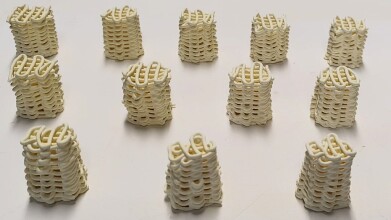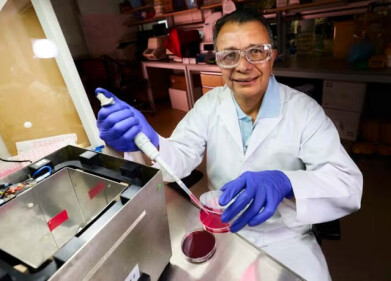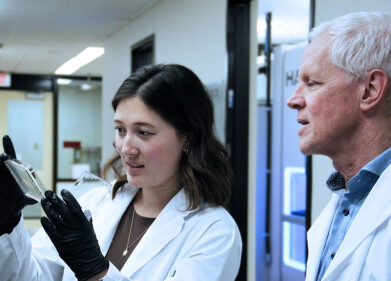-
.jpg) Professor Davide Mattia ( Credit: University of Bath)
Professor Davide Mattia ( Credit: University of Bath) -
 3-D ceramic infused lattices (Credit: University of Bath)
3-D ceramic infused lattices (Credit: University of Bath)
Research News
Engineers create new way to remove PFAS from water
Aug 05 2024
Researchers at the University of Bath, have used 3Dprinted ceramic-infused lattices (or ‘monoliths’) to remove at least 75% of perfluorooctanoic acid (PFOA), common perfluoroalkyl and polyfluoroalkyl substances (PFAS) from water, highlighting this method’s potential as a tool for elimination of health-harming ‘forever chemicals’ from future water supplies.
Man-made and known for causing health issues including harms to reproductive, developmental, cardiovascular systems, PFAS include domestic products, often with water-repellent properties, such as non-stick pans, raincoats, paints, fabrics and firefighting foams.
Dr Liana Zoumpouli, a Research Associate in Bath’s Department of Chemical Engineering, said: “PFAS, or ‘forever chemicals’, are a major focus in water treatment and public health. We have created an efficient way to remove these chemicals from water without using lots of energy.
“Using 3D printing to create the monoliths is relatively simple and it also means the process should be scalable. 3D printing allows us to create objects with a high surface area, which is key to the process. Once the monoliths are ready you simply drop them into the water and let them do their work. It’s very exciting and something we are keen to develop further and see in use.”
While legislators around the world, particularly in the US and EU, have brought in some rules on acceptable levels of PFAS and similar chemicals in drinking water, the researchers say further legislation is likely as the scale of health threats comes into clearer focus.
Co-author Professor Davide Mattia adds: “Currently, these chemicals are not strongly regulated in the UK in drinking water, but there are guidelines and we expect changes in policy quite soon. Water companies are likely to be looking at integrating systems to deal with them.”
The 4cm monoliths are created from ink infused with ceramic indium oxide which is then extruded from a 3D printer. Because indium oxide bonds with PFAS, the chemicals immediately stick to the monoliths and can be removed from the water in under three hours, which is compatible with current water treatment plants in the UK and abroad.
Testing has so far found that the monoliths remove 75% of PFAS from water, with them becoming more effective under repeated use – they undergo high-temperature thermal ‘regeneration’ treatment after each use. This is something the researchers are keen to understand more fully with further experimentation, with aims to also increase the efficiency of the process with further refinement.
The team includes Dr Alysson Martins, Dr Liana Zoumpouli, Dr Antonio Jose Exposito, Dr Jannis Wenk and Prof Davide Mattia.
'3D-Printed In2O3 Monoliths for PFAS Removal' is published in the Chemical Engineering Journal
More information online
Digital Edition
Lab Asia 31.6 Dec 2024
December 2024
Chromatography Articles - Sustainable chromatography: Embracing software for greener methods Mass Spectrometry & Spectroscopy Articles - Solving industry challenges for phosphorus containi...
View all digital editions
Events
Jan 22 2025 Tokyo, Japan
Jan 22 2025 Birmingham, UK
Jan 25 2025 San Diego, CA, USA
Jan 27 2025 Dubai, UAE
Jan 29 2025 Tokyo, Japan


















